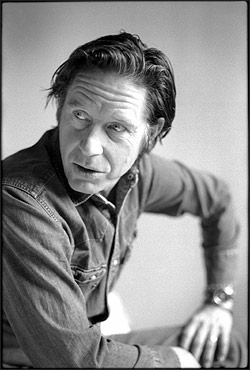JOHN DOE
Forever Hasn’t Happened Yet
(Yep Roc)
Age has its benefits. For one thing, it allows 51-year-old John Doe to sing in a weary, handsomely cracked voice without sounding like a poseur trying on years he hasn’t lived—a valuable skill for a musician, but one even more valuable for an actor, which is how fans of TV’s Roswell know the X frontman. For another, it’s given Doe plenty of time to cultivate relationships with lots of talented friends. To make Forever Hasn’t Happened Yet, his fifth solo album (and first for roots-rock indie Yep Roc, following brief stints with spinART and Kill Rock Stars), Doe called in favors from a handful of them; the rotating cast gives the disc a loose, ramshackle feel that suits Doe’s writing, which always has to do with finding peace in the midst of chaos (or vice versa). Sometimes the guest players inconspicuously flavor Doe’s performance: Former X and Blasters guitarist Dave Alvin bunches up a sheet of reverbed twang beneath Doe’s vocal in opener “The Losing Kind,” while prolific studio guitarist Smokey Hormel gives the demo-quality “There’s a Black Horse” a little improvisational sparkle. Other times, Doe’s buddies turn up front and center: “Twin Brother,” a pretty duet with Grant-Lee Phillips, sounds like a conversation between the title characters, and the funky “Hwy. 5” cranks along on sweet-and-sour harmonies from Neko Case. As Hollywood agents are fond of telling their clients, it’s an ensemble piece in which Doe is the star. MIKAEL WOOD
John Doe plays South Lake Union Park with Lucinda Williams at 845 Terry Ave. N., 206- 281-8111. Fri., June 24. $32.
VARIOUS ARTISTS
Spirits of Life: Haitian Voodoo
(Soul Jazz, U.K.)
In life, as in art, whoever has the best beats wins. Nowhere does rhythmic advantage exert more influence than in possession-oriented religious practice. Consider Santeria, Macumba, Vodoun/Voodoo/Vodou, and the various other Afro-Caribbean modalities of Catholic-saint-coated ancestral-homeland deity worship: With accelerating global Creolization, the syncopation-driven faiths have spread like Miracle Whip from Bahia to Brooklyn and beyond. Granted, they’re not growing by cadence alone. Unlike current number one Pentecostalism, with its One True God/glossolalia agenda, the syncretics all offer enough variety in divine-takeover options to satisfy even the most finicky would-be possessee. Call-and-response singing between priest and believers simply sweetens the bait. Spirits of Life: Haitian Vodou offers plenty in the way of jubilation both percussive and vocal. More than a few revelations, too—Petroceremonies provided half the album’s tracks. Far less common and considerably more down-and-dirty than the older Radapraxis (in lieu of chickens, practitioners often sacrifice pigs or goats), the “hot” variant’s polyrhythms rely more on pure throb than those of its cooler parent. Track 11—one of several devoted to Erzulie-Ti-Jean, a bizarre coupling of the universally venerated love goddess with a nasty-ass, one-footed dwarf—finds houngan (priest) Gerard Gaie Andiernicon, mambo (priestess) Yolette Metallus, six singers, and four drummers cracking the interdimensional barrier with a dense, 6/8 latticework attack largely derived from Yoruba models. After the priest throws a solo over the breakdown with “Zombie”-era Fela-like fire, drums and melody glide into a blessedly propulsive 4/4—no drumming, no deity. ROD SMITH
ISOLéE
Wearemonster
(Playhouse, U.K.)
The byword in underground house last year was big; after three or four years of popping and clicking nebbishness, artists like Black Strobe and Tiefschwarz reintroduced dance-music nerds to fat, buzzing bass lines and simple, banging drums. The biggest anthem across all dance floors, mainstream and left field, was Alter Ego’s aptly titled “Rocker,” surely the only track in recent memory embraced by both avant-electronica fans and P. Diddy. When I saw actually-German-not-French micro-house pioneer Isolée at the beginning of this year, he played a bruising set that caused serious clipping and distortion over the club’s puny sound system. So it’s a pleasant surprise to find that his new album, Wearemonster, is a subtle, intricate record that seriously repays headphone listening. This is a music of layers, stuffed with overlapping details: liquid trails of percussion, ribbons on synth, melodies that seem to atomize before your ears. His pointing-and-clicking finger must be pretty tired from all the edits that went into a track like “Today.” But it’s still club music, never straying from the house pulse for long and pushing out bumping, fudge-sticky disco bass lines. Compared to the sour, electro-tinged oddness of his breakthrough, Rest, the mood of Wearemonster is sweet, almost wistful. Standout cut “Schrapnell” features a curious, pokey country-tinged melody, making me think of the “lonesome cowboy” vibe of Tortoise’s “Along the Banks of Rivers” run through a dance-floor translator. Like the prickly-yet-oceanic productions of another disco maverick, Arthur Russell, Isolée’s music explores both the spatial depths of a club’s layout and the inner space between your ears. JESS HARVELL




